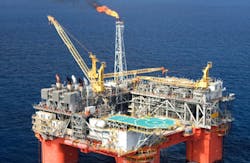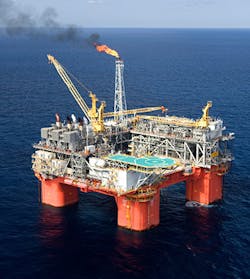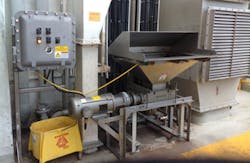By Kevin Bates
Considered one of oil-company BP’s largest and most technically challenging projects, the Atlantis platform sits nearly 200 miles south of New Orleans and reaches down more than 7,000 feet into the Gulf of Mexico.
Part of the larger Atlantis oil field, the platform has produced nearly 200,000 barrels of oil a day since production began in 2007. Each process and all the activities aboard the platform must be done in a precise order to maintain productivity and efficiency, and the crew has no time for unscheduled maintenance or equipment headaches.
However, that’s precisely what they were going through not long ago with their onboard food waste, and the hassle was costing them valuable time and money.
The original food grinder aboard the Atlantis was vastly underperforming and unable to keep up with both the type and amount of waste that the crew needed to shred. Laura Quinn, Atlantis process engineer, recalls the daily struggle the grinder was causing her team.
No more pre-sorting
"Since it wasn’t strong enough to grind down bones, a group of us had to presort the garbage before putting it through the grinder," says Quinn. "It almost defeated the purpose of having a grinder since we were doing so much of the work."
Quinn began looking for another option that didn’t require any of these preparatory steps for disposal. She started her search online and came across the Monster product videos on the JWC Environmental YouTube page. Seeing the variety of solids that the Muffin Monster and Monster Industrial dual-shafted grinders could take care of so cleanly and easily was impressive to Quinn and the rest of the crew.
"It was a huge selling point for me, especially seeing the grinders cut through things like whole chickens and apples," says Quinn. "Those specific foods were the ones we had to deal with by hand before putting them into the grinder. If we didn’t, we would have to deal with a clog."
After Quinn contacted JWC Environmental to get more information on their waste reduction solutions, she was put in connection with Tom Smith, industrial mid-market manager for the Monster Industrial product lineup.
The task at hand
"The Atlantis had some interesting challenges to contend with, both from a waste reduction standpoint and a regulatory standpoint," says Smith.
Because the Atlantis is an ocean-based platform, all operating procedures must fall under MARPOL compliancy — including food waste disposal. Pieces must be under 1-inch in diameter in order to legally be discharged into open water. "Our food grinders are MARPOL-complaint, which makes them ideal for this very specific oil and gas application."
Smith recommended the Monster Industrial 3-SHRED grinder, which uses two rows of sharp steel cutters that rotate slowly with high torque to cleanly and effectively shred troublesome food waste. The unit offers tremendous cutting force with an energy-efficient 5-horsepower (3.7 kW) motor, keeping energy consumption low for long-term cost savings. For added versatility, the unit easily retrofits into an existing facility, and custom hoppers and tooth cutter sizes are available depending on the type of waste.
One final finesse
Once the grinder was installed, Quinn discovered it was almost a perfect fit — with the exception of an outlet piece that was a little too narrow. "We were having some clogging issues on the discharge of the grinder before the water flush point," says Quinn. "So I had emailed JWC to see how we could redesign the outlet."
Smith responded quickly and worked with a group of JWC engineers to redesign the discharge chute to eliminate the clogging problems. The team modeled some concept options and sent them to Quinn for final approval. After a new concept was chosen, JWC sent the updated discharge flange to Quinn and her team. The 3-SHRED was able to get back up and running, and since the installation of the new outlet piece in August 2014, the Atlantis hasn’t had any instances of food waste clogging, and the team hasn’t needed to presort the waste before putting it into the grinder.
"JWC Environmental was so easy to work with," says Quinn. "We had a great experience and we would absolutely work with them again in the future."
Kevin Bates is the global marketing director for JWC Environmental based in Costa Mesa, California. JWC Environmental is a world leader in solids reduction and removal for the wastewater industry with its Muffin Monster grinders and Monster screening, compaction and washing systems. Bates has more than 20 year of experience working with global industrial leaders to solve challenging technical problems spanning a wide range of markets including wastewater, construction and mining.
To learn more about solutions to marine food waste reduction, visit jwce.com/applications.


